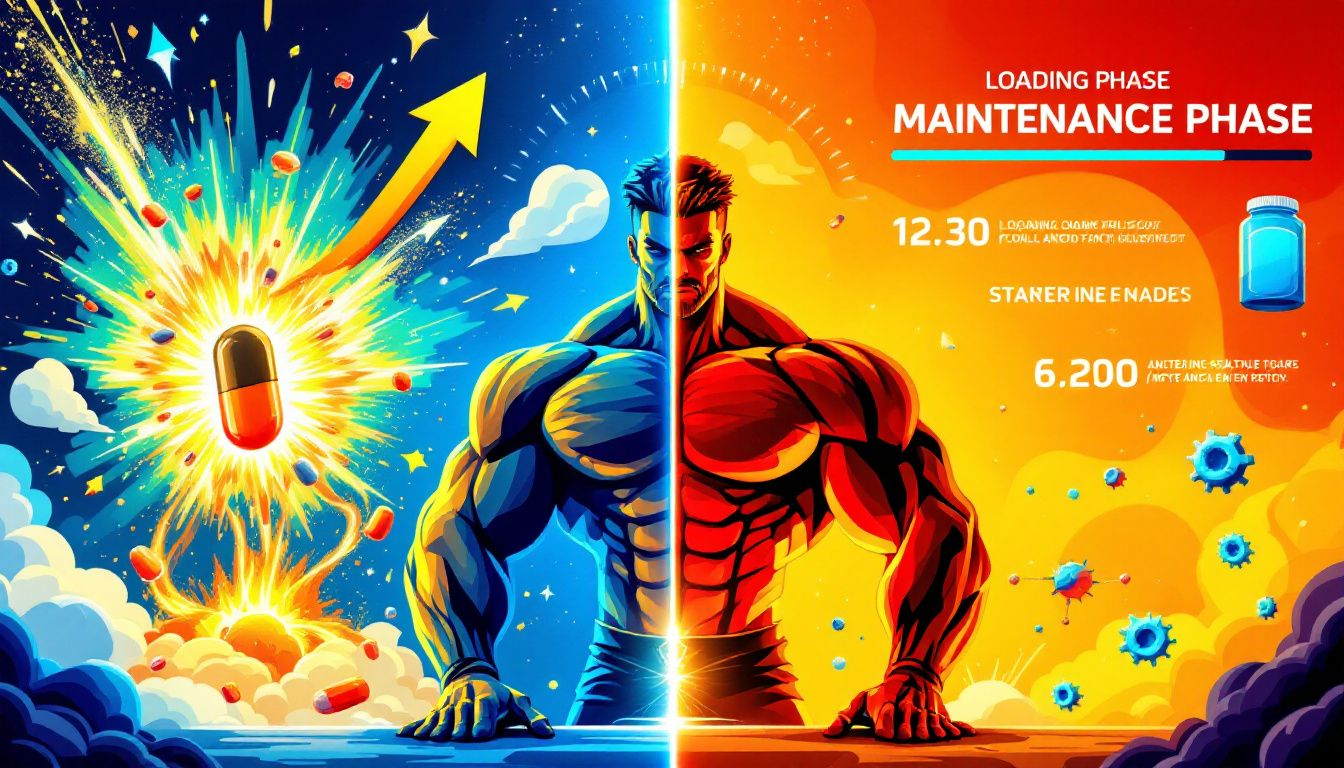

Does creatine make you gain weight? Yes, but mostly through water retention and muscle gain, not fat. This article will explain how creatine affects your body weight and what you need to know.
Creatine causes quick weight gain mainly through water retention and increased muscle mass, not fat gain.
Supplementing with creatine enhances exercise performance by boosting strength and energy during high-intensity workouts.
Following a proper loading and maintenance dosage schedule is essential for maximizing creatine’s benefits.

Creatine can cause rapid weight gain due to various factors, primarily through water retention and muscle mass increase. When you start taking creatine supplements, your body stores more water in your muscle tissues. This is because creatine pulls water into the muscles, increasing their hydration and volume. At the same time, creatine supports lean muscle growth, which is distinct from fat gain. The weight you see on the scale is a combination of these elements.
However, the weight gained from creatine supplementation differs from fat gain. The primary factors are water retention and increased lean muscle mass, not fat accumulation. Let’s explore these two aspects in more detail.
One of the most immediate effects of creatine is water retention. When you start a creatine regimen, you might notice a few pounds of water weight within the first week. This rapid weight gain is due to creatine pulling more water into your muscles, leading to an increase in total body water. Typically, this can result in a gain of 2-4 pounds of water weight.
This water retention is temporary and does not contribute to fat gain. If you stop taking creatine or reduce your dosage, the water weight usually dissipates. This temporary weight gain can be beneficial, as it helps hydrate your muscles, making them fuller and potentially improving their function during workouts.
Beyond water retention, creatine significantly contributes to muscle mass increase. Creatine supplementation helps build muscle weight by enhancing your body’s ability to perform high-intensity exercises, which leads to muscle growth. When combined with resistance training and a diet that supports muscle gain, creatine can lead to substantial increases in lean muscle mass.
Creatine not only boosts muscle strength and performance but also helps prevent muscle loss during calorie deficits. This means that even if you’re trying to lose weight, creatine for weight can help you preserve and build muscle, resulting in a more favorable body composition. Increased muscle mass also boosts your metabolic rate, helping you burn more calories even at rest.

A common concern is whether creatine supplementation leads to fat gain. The answer is no. The primary impact of creatine on body weight is through enhancing lean muscle growth rather than fat gain. Initial weight gain from creatine is primarily due to water retention, not fat accumulation.
Research indicates no significant differences in body fat percentage between those using creatine and those on a placebo. In fact, creatine can promote lean muscle gains while not contributing to fat gain, provided calorie intake is managed.
Long-term use of creatine has been associated with more gains in fat-free mass compared to fat mass. If you’re concerned about gaining fat, rest assured that creatine won’t cause fat gain; it’s the water weight that often leads to misconceptions.

Creatine supplementation is renowned for its ability to enhance exercise performance. It significantly improves muscle strength and power, which are critical for better performance in resistance training. By increasing the availability of energy during workouts, creatine enhances the production and replenishment of adenosine triphosphate (ATP) in muscles.
This boost in energy allows for greater workout intensity and endurance, leading to more significant gains in muscle hypertrophy and overall performance. Regular training amplifies the benefits of creatine, enhancing exercise performance and physical conditioning.
Whether you’re lifting heavier weights or pushing through more reps, creatine helps you achieve your fitness goals more efficiently.

Recognizing the phases of creatine supplementation is key to maximizing its benefits. The loading phase aims to elevate muscle creatine levels quickly, typically lasting 5 to 7 days. During this period, creatine monohydrate is recommended for its proven effectiveness and optimal absorption. After the loading phase, a lower daily dosage is used to maintain the elevated creatine levels.
These phases ensure that your muscles are saturated with creatine, providing the necessary support for muscle growth and performance. Let’s delve into the specifics of each phase.
The loading phase is designed to saturate your muscle creatine stores quickly. Typically, this involves taking about 20 grams of creatine daily for 5-7 days, divided into smaller doses for better absorption. Splitting the daily intake into multiple servings enhances absorption and reduces the likelihood of gastrointestinal discomfort.
Studies suggest that a loading phase can boost muscle creatine stores by 20% to 40%, providing a solid foundation for improved performance and muscle growth. This phase is particularly useful for those looking to see rapid benefits from creatine supplementation.
After the loading phase, you enter the maintenance phase, where a daily dose of 3 to 5 grams is recommended to maintain high creatine levels. For larger athletes, a higher maintenance dose ranging from 5 to 10 grams daily might be necessary.
Consistency is key in this phase. Taking creatine at the same time each day helps maintain stable muscle creatine levels and ensures that you continue to reap the benefits of supplementation. This phase ensures long-term muscle maintenance and performance enhancement.

Creatine, like any supplement, can have potential side effects. The most common issue is weight gain primarily through increased water retention in muscle tissues. While this is generally harmless, it can be a concern for those sensitive to rapid weight changes.
Gastrointestinal discomfort, including bloating and diarrhea, is also reported by some users. These side effects can often be minimized by following the recommended dosage and splitting the intake into smaller servings.
Importantly, current research indicates that creatine does not pose a risk of kidney damage in healthy individuals. Responsible use and adherence to recommended dosages are key to minimizing these side effects.
Maximizing the benefits of creatine requires effective use. This involves combining creatine supplementation with a balanced diet and proper timing. For vegans and vegetarians, a higher loading phase dosage of 6-7 grams taken four times a day is recommended. Correct dosage is crucial to maximize effectiveness and minimize potential drawbacks.
Combining creatine with a balanced diet and exercise routine is particularly important during a weight loss journey. Here are some practical tips to help you get the most out of your creatine supplementation.
Creatine supplementation should be complemented with a balanced diet and regular exercise for optimal results. Creatine is not a standalone solution for losing belly fat and should be used in conjunction with dietary strategies that include a rich intake of protein, fiber, and healthy fats to help burn fat and promote fat loss.
Incorporating carbohydrates in your diet while taking creatine can enhance its effectiveness. A diet rich in these nutrients not only supports muscle growth but also improves body composition, making your fitness journey more efficient.
Research suggests that the best time to take creatine for optimal absorption is post-workout. The recommended dosage for the loading phase is 20 grams per day for 5-7 days. Consistent daily intake, even on rest days, is necessary to maintain effective muscle saturation.
Following these timing and dosage recommendations can help you achieve the best results from your creatine supplementation, ensuring that you maximize muscle growth and improve exercise performance.
In summary, creatine can lead to rapid weight gain primarily through water retention and increased muscle mass, not fat gain. Its benefits in enhancing exercise performance and muscle strength make it a valuable supplement for athletes and fitness enthusiasts. Understanding the loading and maintenance phases, potential side effects, and tips for effective use can help you harness creatine’s full potential.
By combining creatine supplementation with a balanced diet and proper exercise routine, you can achieve your fitness goals more efficiently. Remember, creatine is a tool to support your journey, not a magic solution. Use it wisely, and you’ll see the benefits in no time.
Taking creatine can be beneficial while losing weight, as it may help you maintain workout intensity and improve your overall training results. So, if you're looking to maximize your efforts, adding creatine could be a smart move.
Creatine won’t make you gain fat; it typically leads to weight gain from water retention and increased muscle mass instead. So, no need to worry about adding unwanted fat!
You can expect to see a few pounds of weight gain, primarily from water retention, within just the first week of taking creatine. It's a quick response that many notice right away!
Absolutely, creatine can cause gastrointestinal discomfort like bloating and diarrhea, but sticking to the recommended dosage can help reduce these side effects.
Absolutely, taking creatine on rest days is important for maintaining muscle saturation. It helps maximize your gains and supports recovery.
Share:
Creatine vs Protein: Which is Best for Muscle Growth?
Top 10 Best Creatine for Women: Enhance Performance and Muscle Growth